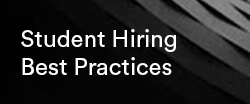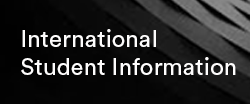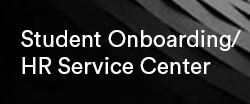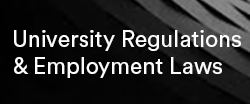Work Eligibility
- All undergraduate students currently enrolled in a degree-granting program at Brown are eligible to apply for on-campus employment (a work-study and/or financial aid award is not required).
- First-year students are eligible for on-campus student employment as of July 1st of the year in which they are to begin their studies at Brown.
- December graduates are not eligible to continue work as student employees following the completion of their studies in December.
- In most cases, May graduates may continue working as student employees until the last pay period in August. International students must work with the Office of International Student and Scholar Services (OISSS) to confirm work authorization after graduation.
- International students must consult the OISSS to ensure their immigration documentation is in place to be eligible for employment.
- Students who are on a leave of absence from the University (inactive student status in Banner) are not eligible for student employment.
Federal Form I-9
- The Federal Form I-9 is used to verify the identity and employment authorization of individuals hired for employment in the United States.
- All U.S. employers must ensure proper completion of the Form I-9 for each individual they hire for employment in the United States.
- Employees are required to present proper documentation for employment authorization within 3 days of the job start date per Federal I-9 Regulations. These documents must be presented to the representatives at the HR Service Center. Students should refer to the list of acceptable documents for guidance on the number and types of documents required.
- Per Federal Government Regulations, all documents presented must be in original form and unexpired. View I-9 form information.
U.S. Social Security Number
- A U.S. Social Security Number is required for all individuals who are receiving income/wages in the United States.
- Students who do not have a Social Security Number must apply for one through the Social Security Administration Office.
- OISSS can assist international students in obtaining and completing the required documentation they need in order to apply for a SSN.
- Students have 90 days from the date they begin working to present their Social Security Card to the HR Service Center (HRSC). Students should present their SSN card to the HRSC as soon as they receive it.
- A U.S. Social Security Card is required to set up Direct Deposit in Workday.
International Students
- After International students complete the Federal I-9 Form, they must email [email protected] and request a username and password for Sprintax Calculus from the Foreign National Tax Office.
- Most international students do not have a U.S Social Security Number. This is a requirement for all international students who are employed in the United States.
Pay
- All undergraduate student employees are considered non-exempt employees for the purposes of the Fair Labor Standards Act (FLSA).
- Undergraduate student workers must be paid an hourly rate. Federal and State law requires that students working in non-exempt positions, be paid an hourly rate no less than the federal or state minimum hourly wage and they must be paid for every hour worked.
- Underreporting or inaccurate reporting of hours worked are violations of the FLSA. Student employees are required to enter and submit ALL hours worked on a weekly basis in Workday Student Time Tracking in order to ensure they are compensated accurately for all hours worked.
- Stipend or “lump-sum” compensation is permitted only for scholarship awards and other instances, which must be approved by Student Employment in advance. Examples of allowable lump sum awards include UTRAs, Mellon Minority Fellowships, and Royce Fellowships. Please visit the Student Employment website to view details of allowable student compensation and opportunity categories, along with examples and instructions.
- Students are strongly encouraged to limit their work to 20 hours per week while school is in session.
- International students on a student visa can work no more than 20 hours per week when school is in session. Working more than 20 hours when school is in session is in violation of student visa requirements.
- During non-academic sessions (Winter or Summer Break), international students do not have a restriction on weekly hours worked.
- Non-exempt Student Workers must notify their supervisors of additional work arrangements at Brown University because of the potential impact on overtime pay.
- Non-Exempt Student Workers receive overtime pay for all hours worked in excess of 40 hours in a standard Workweek.
- If a student works an excess of 40 hours within a standard workweek, overtime compensation is required per the FLSA. Federal law requires that employees who work in non-exempt positions, including students, must be paid time and one-half for the time worked in excess of 40 hours in one workweek (This is total hours for all on-campus positions).
- When a student worker works at two different hourly rates of pay and is eligible for overtime, the rate of pay (for purposes of calculation of overtime) is the blended rate of the two hourly rates during the work period for which the calculation is made. Overtime pay is calculated at the rate of one and one-half times the weighted average of the two rates.
- Non-exempt Student Workers who work 6 hours must be provided a 20-minute unpaid break. Non-exempt Student Workers who work 8 hours must be provided a 30-minute unpaid break.
- There is no legal requirement for paid breaks. However, student employees who work four consecutive hours may take one 15 minute (paid) break during that time as approved by their supervisor. Breaks may not be taken at the beginning or end of the shift, or to prolong a lunch break.
Termination Policy
Voluntary: Students may resign from a position at any time. It is recommended that students provide their supervisor 1-2 weeks’ notice when leaving a student employment position.
Involuntary: All employees, including student workers, are employed on an at will basis. As such, Brown University reserves the right to terminate an individual’s employment at any time for cause or no-cause. However, in general, when work performance issues arise, supervisors should immediately discuss the issue(s) with the student, provide constructive feedback and document the conversation(s). If the job performance does not improve, the supervisor should discuss the appropriate course of action with their department manager and/or contact UHR Student Employment. However, there may be instances where prior performance discussions or policy violations require immediate termination.




